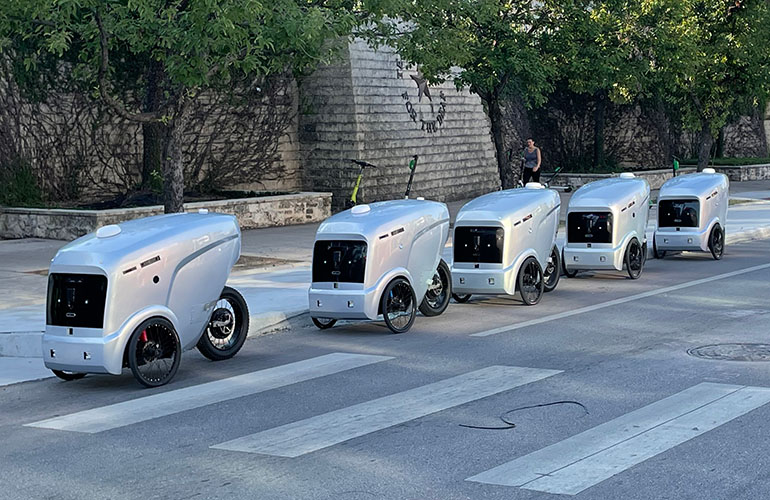Efficient Autonomy: Revolutionizing Delivery Services with Autonomy


Pioneering the Future: The Dynamics of Autonomous Delivery Services
Autonomous delivery services represent a cutting-edge evolution in the realm of logistics and transportation. This article explores the transformative impact of autonomy on delivery services, delving into the technologies driving this innovation, the benefits it offers, and the challenges that accompany this futuristic approach.
Technological Foundations of Autonomy
At the core of autonomous delivery services lies a sophisticated amalgamation of technologies. From artificial intelligence and machine learning to sensors, cameras, and advanced algorithms, these systems work in tandem to enable vehicles and drones to navigate and make decisions autonomously. This technological foundation empowers these delivery solutions to operate with precision and efficiency.
Unmanned Aerial Vehicles (UAVs) in the Sky
One of the most captivating aspects of autonomous delivery services is the integration of unmanned aerial vehicles (UAVs) or drones. These airborne vehicles have the capability to navigate through the skies, delivering packages to remote or challenging-to-reach locations. UAVs are not only fast but also contribute to reducing the carbon footprint associated with traditional ground-based delivery methods.
Autonomous delivery services are reshaping the logistics landscape, bringing unparalleled efficiency and innovation to the delivery ecosystem.
Ground-based Autonomous Vehicles
On the ground, autonomous delivery vehicles navigate roads and sidewalks, transporting packages from distribution centers to the doorstep of the recipient. These vehicles utilize advanced sensing technologies, such as lidar and radar, to navigate safely through varied environments. Ground-based autonomy is particularly well-suited for urban and suburban settings, providing a versatile solution for last-mile delivery challenges.
Enhanced Efficiency and Speed
Autonomous delivery services are synonymous with enhanced efficiency and speed. The precision and accuracy with which these systems operate contribute to faster and more reliable delivery times. Whether it’s a package delivered by a drone soaring above the city or an autonomous vehicle weaving through traffic, the streamlined processes significantly reduce the time required for order fulfillment.
Environmental Sustainability
Beyond efficiency, autonomous delivery services contribute to environmental sustainability. With the ability to optimize routes, reduce idle time, and minimize energy consumption, autonomous vehicles and drones represent a more eco-friendly alternative to traditional delivery methods. This aligns with the growing emphasis on sustainability in various industries.
Challenges on the Horizon
While the potential of autonomous delivery services is vast, challenges persist. Regulatory frameworks, safety concerns, public acceptance, and technological limitations pose hurdles to widespread adoption. Overcoming these challenges requires collaborative efforts from industry stakeholders, policymakers, and technology developers to create a conducive environment for autonomous delivery to thrive.
Last-Mile Delivery Revolution
The concept of last-mile delivery, the final leg of the delivery journey to the recipient’s location, is undergoing a revolution with autonomous services. By efficiently navigating complex urban landscapes and delivering packages directly to doorsteps, autonomous vehicles and drones address one of the most significant challenges in the logistics industry. This evolution is reshaping customer expectations and setting new standards for convenience in the delivery experience.
Security and Privacy Considerations
As autonomous delivery services become more prevalent, security and privacy considerations come to the forefront. Ensuring the secure and confidential delivery of packages, protecting customer data, and addressing concerns related to potential misuse of autonomous technology are crucial aspects that require robust safeguards and regulatory oversight.
Future Integration with Smart Cities
The future of autonomous delivery services is intertwined with the vision of smart cities. As urban environments become more interconnected, autonomous vehicles seamlessly integrate into the fabric of smart city infrastructure. From real-time traffic management to optimized delivery routes, the synergy between autonomous delivery services and smart cities holds the potential to redefine urban logistics and enhance overall efficiency.
A Glimpse into Tomorrow
In conclusion, autonomous delivery services offer a glimpse into the future of logistics. The convergence of advanced technologies, the embrace of aerial and ground-based autonomy, and a commitment to efficiency and sustainability are transforming how goods are transported and delivered. As these innovations continue to mature and overcome challenges, the era of autonomous delivery services is poised to revolutionize the way we receive packages, marking a significant leap forward in the evolution of transportation and delivery systems.






